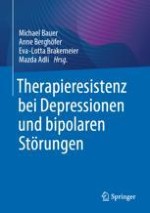Zusammenfassung
Affektive Erkrankungen in Schwangerschaft und Postpartalzeit sind häufig und können, insbesondere wenn sie nicht ausreichend gut behandelt werden, negative Folgen für die ganze Familie inklusive der Entwicklung der exponierten Kinder haben. Therapierefraktäre oder schwierig zu behandelnde uni- oder bipolare Depressionen in dieser besonderen Zeit scheinen etwas weniger häufig zu sein als in anderen Lebensphasen, sind aber bisher auch deutlich weniger beforscht. Bei der Behandlung der Mutter müssen in der Schwangerschaft immer potenziell embryo- und/oder fetotoxische Effekte der pharmakologischen oder nichtpharmakologischen Therapien mitbedacht und in der Stillzeit insbesondere bei Medikamenten der Übergang in die Muttermilch beachtet werden. Hier mangelt es aus ethischen Gründen an randomisiert-kontrollierten Studien. Dennoch gibt es ausreichend Daten aus Register- und Beobachtungsstudien sowie Fallserien, um erste Empfehlungen für eine therapierefraktäre uni- bzw. bipolare Depression in Schwangerschaft und Stillzeit herleiten zu können.
